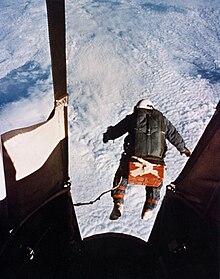
Back Stratosphärensprung German Salto estratosférico Spanish پرش فضایی Persian Падобрански скок из стратосфере Serbian Uzay atlayışı Turkish

Similar to skydiving, space diving is the act of jumping from an aircraft or spacecraft in near space and falling towards Earth. The Kármán line is a common definition as to where space begins, 100 km (62 mi) above sea level. This definition is accepted by the Fédération Aéronautique Internationale (FAI), which is an international standard setting and record-keeping body for aeronautics and astronautics. The United States Air Force uses 50 nautical miles (300,000 feet) to award astronaut wings.[1]
No successful space dives (above 100 km) have been completed to date. In 1959 Joseph Kittinger accomplished a jump from 74,700 feet (22.8 km); he then set a long-standing record in 1960 when he jumped from 102,800 feet (31.3 km). In 1962, Yevgeni Andreyev jumped from 83,523 feet (25.458 km) and set a new longest-distance free fall record that was surpassed by Felix Baumgartner who made three jumps in 2012 from 71,581 feet (21.818 km), 96,640 feet (29.46 km), and 128,000 feet (39 km), respectively. Alan Eustace set the current world record for highest and longest-distance free fall jump in 2014 when he jumped from 135,898 feet (41.422 km).[2] However, Joseph Kittinger still holds the record for longest-duration free fall, at 4 minutes and 36 seconds, which he accomplished during his 1960 jump from 102,800 feet (31.3 km).
Higher jumps from the mesosphere or thermosphere have yet to be successfully performed, though Orbital Outfitters,[3] now defunct, was working to create a suit that was supposed to enable space diving. Space diving from beyond the stratosphere was first imagined in 1934, appearing in E. E. "Doc" Smith's science fiction novel Triplanetary.[4]
- ^ Speed Weed (2007-06-25). "High dive - Space diving". Popular Science. Germany , Salzgitter: Bonnier Corporation. Archived from the original on 2012-10-22. Retrieved 2012-10-10.
- ^ "Felix Baumgartner: First person to break sound barrier in freefall". guinnessworldrecords.com. 2022. Retrieved 2022-11-09.
- ^ Orbital Outfitters Archived 2012-10-28 at the Wayback Machine
- ^ Christensen, Bill (2007-08-03). "Space Diving by 2011?". Space.com. New York. Archived from the original on 2012-10-14. Retrieved 2012-10-10.